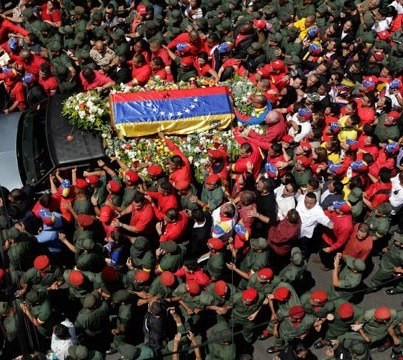Hugo Chavez's Body To Go on Display in Venezuela 'For all Eternity'

The body of Hugo Chavez is to be embalmed and put on display "for all eternity" in a glass casket at a military museum near the presidential palace in Caracas where he ruled for 14 years.
Venezuela's acting leader Nicolas Maduro said Chavez belonged to his people and would be preserved so that "his people will always have him".
Chavez will follow in the footsteps of other embalmed leaders such as Lenin, Ho Chi Minh and Mao Zedong, said Maduro.
Chavez would first lie in state for "at least" seven more days before the museum becomes his permanent home, Maduro added.
More than 30 heads of government, including Cuban President Raul Castro and Iranian leader Mahmoud Ahmadinejad attended his funeral.
"We have decided to prepare the body of our Comandante President, to embalm it so that it remains open for all time for the people. Just like Ho Chi Minh. Just like Lenin. Just like Mao Zedong," Maduro said, adding that the body would be held in a "crystal urn" at the Museum of the Revolution, a mile from Miraflores presidential palace.
Scientists at the Research Institute for Biological Structures in Moscow are recognised as the world authorities in the preservation of bodies, having treated the remains of national leaders including Ho Chi Minh and Kim Jong-Il, and prepared Lenin's body in 1924.
In 2004, Lenin's embalmer Yuri Denisov-Nikolsky gave an interview in which he recalled how his hands had trembled when he began working on the body.
Lenin's successor Josef Stalin's remains were put on display after his death in 1953, until his successor, Nikita Khrushchev, had them interred in the Kremlin Wall in 1961.
North Korea's Kim Jong-il and the former Philippine leader Ferdinand Marcos were also embalmed.
The move had "some logic to it," said Margot Light, Professor Emeritus at the London School of Economics, "in order to retain the spirit of the revolution".
"It's not as ghoulish as it might seem, it has a practical purpose for patriotic reasons and to perpetuate a movement," Professor Light told the BBC.
She said that Lenin's death in 1924 led to a concerted campaign to establish an ideology of Leninism, "to talk up the revolution and the movement and cement his international significance".
Professor Sue Black, of the Centre for Anatomy and Human Identification at the University of Dundee, said the principle of embalming was much like pickling.
Major vessels and veins were opened, blood drained, and the vascular system treated with a solution, said Professor Black.
© Copyright IBTimes 2025. All rights reserved.





















